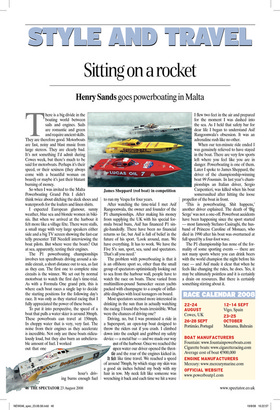Sitting on a rocket
Henry Sands goes powerboating in Malta There is a big divide in the boating world between sails and engines. Sails are romantic and green and require ancient skills. They are therefore good. Motorboats are fast, noisy and blast music from large stereos. They are clearly bad. It’s not something I’d admit during Cowes week, but there’s much to be said for motorboats. Perhaps it’s their speed, or their sexiness (they always come with a beautiful woman on board) or maybe it’s just their blatant burning of money.
So when I was invited to the Malta Powerboating Grand Prix I didn’t think twice about ditching the deck shoes and waterproofs for the loafers and linen shirts.
I expected European glamour, sunny weather, blue sea and blonde women in bikinis. But when we arrived at the harbour it felt more like a village fête. There were stalls, a small stage with very large speakers either side and a big TV screen showing the fast-car telly presenter Tiff Needell interviewing the boat pilots. But where were the boats? Out at sea, apparently, testing their engines.
The P1 powerboating championships involves ten speedboats driving around a sixmile circuit, a short distance out to sea, as fast as they can. The first one to complete nine circuits is the winner. We set out by normal motorboat to watch the first day’s time-trial. As with a Formula One grand prix, this is where each boat races a single lap to decide the starting positions for the following day’s race. It was only as they started racing that I fully appreciated the power of these boats.
To put it into perspective, the speed of a boat that pulls a water skier is around 30mph. These powerboats can travel at 150mph. In choppy water that is very, very fast. The noise from their engines as they accelerate is incredible. Not only are these boats ridiculously loud, but they also burn an unbelieva James Sheppard (red boat) in competition to run my Vespa for four years.
After watching the time-trial I met Asif Rangoonwala, the owner and founder of the P1 championships. After making his money from supplying the UK with his special formula bread buns, Asif has financed P1 single-handedly. There have been no financial returns so far, but Asif is full of belief in the future of his sport. ‘Look around, man. We have everything. It has to work. We have the Five S’s: sun, sport, sea, sand and spectators. That’s all you need.’ The problem with powerboating is that it is an offshore sport so, other than the small group of spectators optimistically looking out to sea from the harbour wall, people have to watch the race on boats. These varied from multimillion-pound Sunseeker ocean yachts packed with champagne to a couple of inflatable dinghies with local teenagers on board.
Most spectators seemed more interested in drinking in the sun than in actually watching the racing. I found the boats irresistible. What were the chances of driving one?
Driving, no, but I was promised a ride in a Supersport, an open-top boat designed to throw the riders out if you crash. I climbed down into the cockpit and grabbed my safety device — a metal bar — and we made our way o ut of the harbour. Once we reached the pen water our driver opened the throte
and the roar of the engines kicked in.
t like time travel. We reached a speed und 70mph, by which stage my skin was d six inches behind my body with my tow. My neck felt like someone was h ing it back and each time we hit a wave I flew two feet in the air and prepared for the moment I was dashed into the sea. As I held that safety bar for dear life I began to understand Asif Rangoonwala’s obsession. It was an adrenaline rush like no other.
When our ten-minute ride ended I was genuinely relieved to have stayed in the boat. There are very few sports left where you feel like you are in danger. Powerboating is one of them. Later I spoke to James Sheppard, the driver of the championship-winning boat 99 Fountain. In last year’s championships an Italian driver, Sergio Carpentieri, was killed when his boat somersaulted after hitting the loose propellor of the boat in front.
‘This is powerboating. Shit happens,’ another driver explained. The death of ‘Big Serge’ was not a one-off. Powerboat accidents have been happening since the sport started — most famously Stefano Casiraghi, the husband of Princess Caroline of Monaco, who died in 1990 after his boat was overturned at full speed by a four-foot wave.
The P1 championship has none of the formality of some sporting events — there are not many sports where you can drink beers with the world champion the night before his race — and Asif made it clear that when he feels like changing the rules, he does. Yes, it may be ultimately pointless and it is certainly a drain on resources. But there is certainly something stirring about it.


























































 Previous page
Previous page